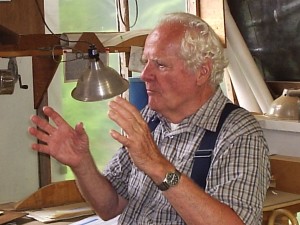
Bill Cooper teaching a class in the Woods Hole Museum’s boat shop. COURTESY WOODS HOLE HISTORICAL MUSEUM.
WOODS HOLE – Bill Cooper loved to tell stories, especially of his time as a young man at sea.
When Cooper passed away at age 83 in 2011, his wife Judy gave the Woods Hole Historical Museum a 200-page manuscript her husband had been writing on and off for 15 years.
The memoir, originally written out in longhand by Bill and painstakingly typed up by Judy, were his memoirs of the years 1944 to 1948 when he was a deck hand on the Atlantis, the majestic 143-foot steel-hulled ketch that was the first research vessel of the Woods Hole Oceanographic Institution, used from 1931 to 1966.
During his four years on the Atlantis, Cooper learned many of life’s lessons from the seasoned old sailors, true “deep water men from out of the past,” as Cooper wrote, who had rounded Cape Horn and lived to tell about it.
They taught him everything he knew about boats and sails, about weather and tides, about fairness and pride.
The Manuscript
Over the dinner table to his wife and five children and over many years in his boat shop, he would regale friends and customers with his tales of when, at age 17 he went to sea.
Later this winter, the museum will publish those memoirs as “Atlantis Stories,” Bill Cooper’s stories as he remembered them. The book is edited by two Woods Hole locals who have also spent years at sea, Arthur Gaines, who is a oceanographer emeritus at WHOI, and Jay Burnett, who spent 28 years on research vessels as a fisheries scientist at the National Oceanic & Atmospheric Administration.
In editing the book, both Gaines and Burnett were struck by Cooper’s front row seat to history as seen from the deck of the famous research vessel, the events he witnessed, people he met, and things he learned, all told in Cooper’s straightforward style.
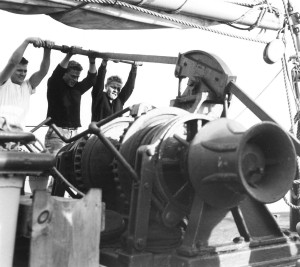
Bill Cooper, right, and other young crewmen work the anchor windlass on the “Atlantis.” COURTESY WOODS HOLE HISTORICAL MUSEUM.
Front Row Seat To History
Between the lines of the book, as a sort of sub-theme, the reader glimpses the turmoil of the war years and how everything was disrupted.
“He was on the ship on D-Day. He was on the ship when the first atomic bomb was set off, when Germany surrendered, when Japan surrendered,” Gaines said. “In the course of his time on the Atlantis, he’s coming into contact with some of the major events in history.”
Cooper spent the hurricane of ’44 on the ship, during his first trip on the Atlantis. He lived through threat of submarine warfare and the marshaling of industry to meet the challenge. “He touched so many important events of that era,” Gaines said.
Gaines, 72, and Burnett, 65, committed to not changing any of the wording in the book.
“We wanted it to be all Bill because of the special way he had of telling the story,” Burnett said. “He had a great style, very direct, not a lot of embellishment and extra words. What struck me is it didn’t read like something remembered dimly and embellished. It really read like a 17-year old was thinking and experiencing. It wasn’t an older man writing this. It was little Bill Cooper, the youngest man on the Atlantis.”
Young Bill Cooper Comes To Falmouth
Bill Cooper stumbled into his brush with scientific history.
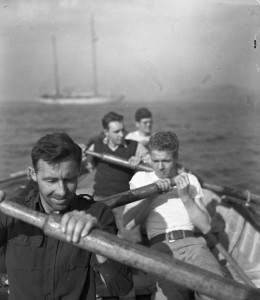
Bill Cooper, right foreground, rows with a crew in the whaleboat that served as a lifeboat in the “Atlantis.” COURTESY WOODS HOLE HISTORICAL MUSEUM.
The year was 1944 and WHOI was desperate for young men to work as crew on its scientific vessel, Atlantis. Such men were hard to find because of the war.
Cooper had an early bout of tuberculosis that left him without one of his knees, so he could not serve in the military.
He grew up in Brooklyn, but he left home as a teenager and ended up as a crewmember on a yacht that pulled into Quissett on a summer day in 1944. There he spotted some girls swimming, and he fell in love—with Quissett and with one of the girls, who would later become his wife, Judy.
Wanting to stay in the area, he went down to Woods Hole in search of a job and he was hired as a deckhand on the Atlantis.
As the youngest man on the sailing vessel, Cooper relied on the old hands to teach him. He writes reverentially about those older sailors, many of whom were Scandinavians. The utmost respect was paid to those who had sailed on square riggers around Cape Horn.
In his memoirs, he calls them “squareheads,” but Burnett and Gaines explain, while it may sound to today’s ears as a slur, Cooper meant it as the highest compliment, that they were true sailors.
“It was an honorific. They were the master seamen, probably of all time,” Gaines said.
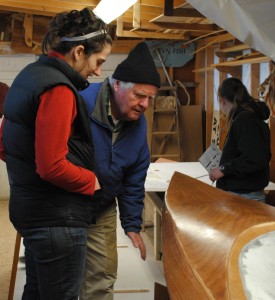
Bill Cooper with a student, Abby Heithoff, at the Woods Hole Museum boat shop. Photo courtesy of Susan Fletcher Witzell/Woods Hole Historical Museum.
Boat-building
When he was not at sea, Cooper spent those early winters in Falmouth apprenticing as a boat builder with Einar Edwards. “That’s what he fell in love with,” Burnett said, and boat building was to become Cooper’s profession for the rest of his days.
His father-in-law owned the Quissett Harbor boatyard and he worked for him and for major boatyards along the East Coast before opening his own boat building shop behind his house on Gunning Point in the Sippewissett section of Falmouth.
He was long considered a master boat builder in the area and, as Gaines put it, “the Herreshoff guy,” who you went to if you needed help maintaining a classic wooden sailboat.
Years later, he helped to start the boat building program at the Woods Hole Historical Museum where he taught generations of locals and visitors about wooden boats.
A Patient Teacher
Arthur Gaines and his wife, Jennifer, came to Woods Hole in 1977. Gaines’s first full-time job in Woods Hole was as the chief scientist at Sea Education Association. He spent a year at sea on their ship Westward, going on five cruises. Jennifer Gaines, who is director of the Woods Hole Historical Museum, is a lifelong sailor.
With a couple of friends, Arthur and Jennifer Gaines purchased an old Herreshoff 12 ½, the sleek wooden boats that are esteemed by sailors the world over.
Cooper, who lived nearby, had a fleet of a dozen or more Herreshoffs that he maintained for locals and summer people.
So Gaines would ask Cooper for advice on how to maintain his boat and Cooper would tell him how it was done.
“He showed us how to steam the oak frame to do repairs,” Gaines said, as an example.
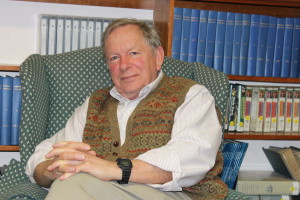
Arthur Gaines, one of the editors of “Atlantis Stories,” at Woods Hole Public Library. CAPE COD WAVE PHOTO
That was how the friendship started.
As it turned out, so many people wanted Cooper’s advice on maintaining boats that he started running classes in the evenings in what Gaines called, “marlin spike seamanship,” the discipline of handling and manipulating rope and rope work.
Cooper would teach the arts of classic seamanship, like wrapping rope with beeswax cord to prevent unraveling and how to splice the rope.
“The notable thing was he was very comfortable as a teacher,” Gaines said. “He had a rapt audience.”
Many of Cooper’s students were Woods Hole scientists with Ph.Ds. But, although Cooper never graduated from high school, his students had enormous respect for their teacher’s expertise, much of which he learned years earlier as a crewman on the Atlantis.
“His classroom was the wheelhouse, the fo’c’sle and the seawash deck,” Gaines said.
Prized Possession—Not Just A Bucket
One of Gaines’ prized possessions is the seaman’s tool bucked that Cooper taught him how to make many years ago.
The handle is a five-pointed star knot and mahogany is used for the bottom. The cylinder is stretched canvas and the top is secured with wire rope.
Just a bucket used to carry tools, lines, and needles, but when a sailor walks down the dock with one that is made right, it indicates a certain level of skill that is priceless, Gaines said.
“People who showed him how to make it were the ultimate seamen of their day and maybe ever,” Gaines said. “He called them squarehead seamen. I learned how to [make the bucket] from him 35 years ago and he learned how to do it 35 years before that, on the Atlantis.”
By 1945 when the younger mariners were back from the war, Cooper sensed an era had ended. The master sailors who taught him were now elderly and retiring. “They were the senior faculty of his school,” Gaines said.
Years in Falmouth
After his adventures on the Atlantis, Cooper lived out his life in Falmouth raising a family, working in the boatyard, and volunteering with the Woods Hole Museum boatbuilding program on Saturday mornings.
“You could hear the laughter and banter around here on Saturday mornings,” when Cooper was at the museum, Gaines said.
He served over 20 years as an elected town meeting member and he had strong opinions on a number of things. One of the things he used to get exorcised about, according to Gaines, was the way the town allocated mooring permits. Cooper thought the system, with its decades-long waiting list, was unfair. He tried to take the matter through the courts and his case made it all the way to the Supreme Court, which refused to hear it.
Fairness was a very important concept to Cooper. He tells the story in his book of when the Atlantis docked at a Coast Guard base in Florida and Cooper was riding a bus into town. A heavily decorated Army captain, a black man, boarded the bus and walked to the back to sit down. Soon after, a private boarded the bus, a white man, and sat in the front.
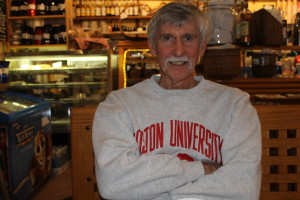
Jay Burnett, one of the editors of “Atlantis Stories,” talks about the book at Pie in the Sky in Woods Hole. CAPE COD WAVE PHOTO
“Bill very subtlely says how wrong that was,” Burnett said. “I thought that was impressive that an 18-year-old would pick up on that.”
“He was known for taking contrary positions,” Gaines said. “Most of us who were his friends for 30 years or more have crossed his temper. But he got over it instantly. He never held a grudge.”
Over the years, many people asked Bill Cooper if they could record his stories as oral histories but he always refused, Jennifer Gaines recalled.
“When he passed away in 2011, his many admirers thought those stories were gone with him,” she said. So she was delighted when Bill Cooper’s wife Judy showed up at the museum one day with a large amount of papers.
They were his stories, and now they belong to everyone.
“Atlantis Stories” is for sale through the Woods Hole Historical Museum. The book costs $37.14 includes sales tax. Shipping is $3.00 extra.
– Laura M. Reckford

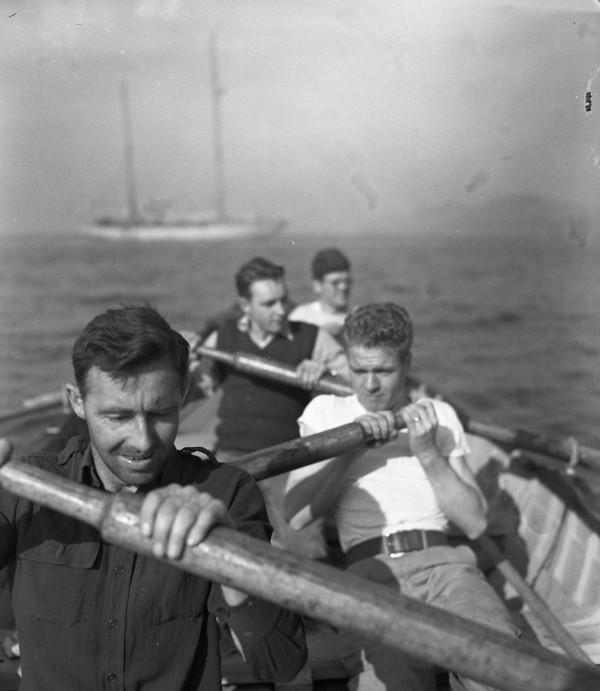
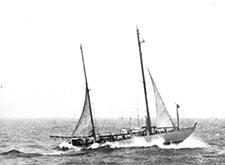


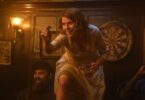


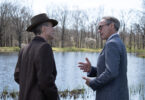
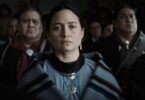










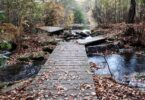

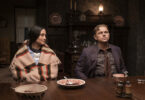




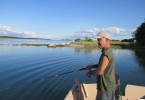

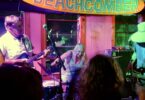

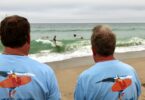
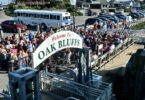
Great article, Laura. Wish I could have known this wonderful, talented man. Can’t wait to read the book!
Laura
What a wonderful article; I will be visiting Anne soon and I will have her take to the museum.
What a treasure He must have been but he left his legacy.
Janice